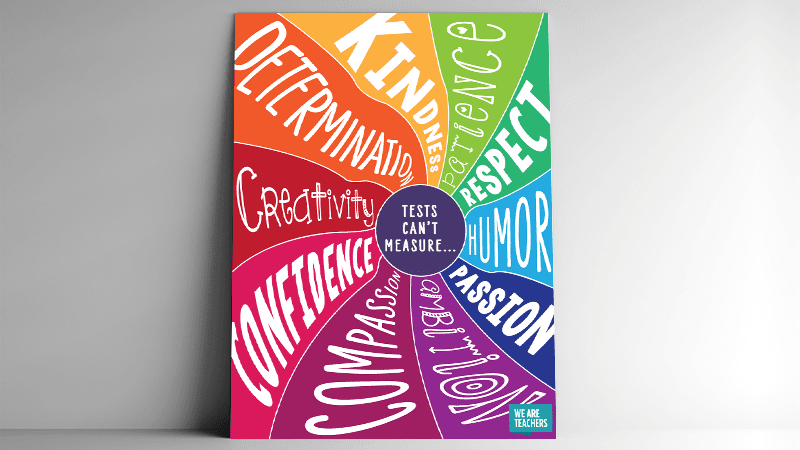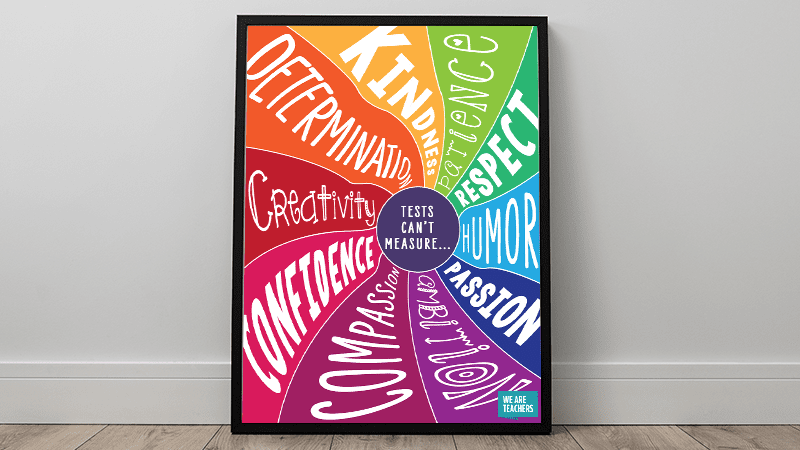We live in a world where test results and scores matter … a lot.
Even though most of us acknowledge the limits of testing and challenge using it exclusively for grading, it’s still a practice that is ingrained in our education system. Schools are ranked based on their test scores, often putting communities in stiff competition with one another and further widening the achievement gap.
Test scores are also used to reward (and therefore also not reward) teachers, who often have very little power to make a big impact on the results. For instance, merit-based pay is a reality for teachers in many districts.
And then there’s the kids. Testing immediately ranks students, starting at a very young age. Those who do well get praise, recognition, and advanced placements, while those who struggle with testing are often left behind.
Study after study, like this one from Harvard Graduate School of Education, tells us that standardized testing effects students’ self-esteem and well-being. Yet, scores are still incredibly important to parents, schools, districts, and society as a whole. While we might not be able to overhaul these practices overnight, we can do our part to show students they are much more than their test scores.
Get our free Tests Can’t Measure poster to download and hang up in your classroom.

Then read on to learn more about the qualities tests can’t measure.
The power of yet (I can’t do that … yet) is a message showing up in classrooms across the country as part of an effort to encouragd a positive growth mindset . Studies, like this one from the American Psychological Association, tell us that self-determination is powerful in enhancing learning and improving post-school outcomes. So keep encouraging your students to have that can-do attitude. Hard work does pay off.
Why are some people more creative than others? This answer has baffled scientists for years, but recent research suggests that creative brains really are “wired” differently. Being creative can mean so many different things—remind your students of this regularly and celebrate those creative moments, big and small.
Compassion is definitely something all of us need at some point in our lives. And at the same time, it’s a very important thing to learn how to give. This is a trait with strong ties to mindfulness, and it’s a wonderful thing for kids to have.
You can have the highest test scores in your class, but without ambition, they won’t matter much. Ambition, more than testing, can make a big difference in shaping a student’s future. Encourage students to be ambitious and go for their dreams.
A recent Stanford study recognizes the importance of passion, but it also says telling people to find their passion isn’t the best advice. The study concluded that doing so can narrow a student’s focus too much. Instead, researchers say it’s important to tell students to “develop your passions” along the way. This will encourage students to explore many interests and hobbies.
Having a good sense of humor is a life skill that will serve your students well for years. There are so many benefits of having humor in your life. So remember this when that student in your class—you know, that one—is trying to make all the other kids laugh. They might be a disruption, but they’re also working on a very important skill.
Can respect matter more than money when it comes to happiness? This study says it can, so keep encouraging respect and recognizing your students when they show it. By integrating lessons about respect into your classroom and encouraging students to respect themselves, their peers, and adults, your kids will be set up for long-term success.
Patience can mean power for kids and adults, but it doesn’t always come easily or naturally. Teachers are rock stars at encouraging patience in kids, and this is a good reminder to celebrate these moments in the classroom.
There is no doubt that confidence leads to long-term success. By setting your classroom up to build confidence in students, you can make such a difference in how they view themselves now and in the future.
Kindness is a powerful trait to have at any age, and yes, there may be a science to it . Kindness can increase energy, happiness, and life span, according to the Random Acts of Kindness website. Kindness is a common theme popping up in schools across the country—let’s keep encouraging it in classrooms every day.
What are other traits that tests can’t measure? Share on our WeAreTeachers HELPLINE group on Facebook.
Plus, the realities of test anxiety in our schools.











